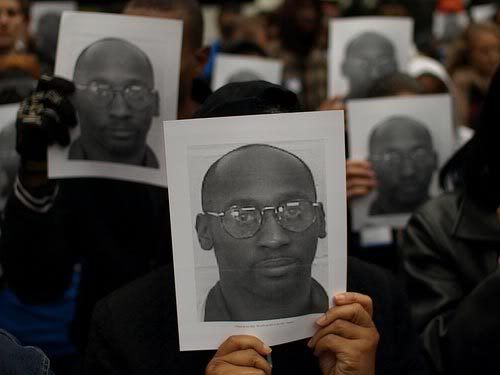On September 21, 2011, the State of Georgia plans to kill Troy Davis by lethal injection. If it happens, this execution will not be an unusual event. In Texas this year there have already been ten executions. In the United States this year there have been thirty-three executions. In fact, there have been some days in 2011 when there were two executions. But in general most, if not all of these killings have gone unnoticed. It’s as if someone had pressed the mute button, so we could not hear the anguish or see the tears, so we could not see what was being done in our names.
There were two executions planned in Texas this week. On September 13, 2011, Texas killed Steven Woods for 2001 a double murder. And on September 15, 2011, it took the US Supreme Court’s last minute stay to stop the planned killing of Duane Buck. Buck got some deserved attention because his death sentence included egregious “expert” testimony that Black people are more dangerous than whites. But in general, state killing goes on largely unnoticed. And without noticeable scrutiny. Or opposition.
Troy Davis is an exception to the silence and what appears to be acquiescence to state killing. Thank goodness. And that may be because Troy Davis is likely innocent. The case against him has disintegrated since his trial. It has fallen apart as witnesses recanted their testimony and explained the police coercion in interrogations that made them perjured themselves at his trial. Troy Davis appears to be innocent, a circumstances that Justice Scalia has opined in this very case is of no constitutional significance. Despite all of this Georgia relentlessly pursues killing him. So Troy Davis has managed to attract attention, which he completely deserves, and has elicited remarkable and justified eloquence in his defense. I wish others who have faced execution had received similar support, but I can understand completely why they have not. And I am pleased that the execution of Troy Davis has evoked such strong opposition.
I have twice before written about Georgia’s desire to kill Troy Davis, on July 7, 2006 and onAugust 9, 2009, and here I am again more than five years later saying the same thing, trying to ask you to ask the State of Georgia to spare the same man, Troy Davis. I won’t repeat all the reasons.
Troy Davis should be spared.
Alll I can do now is urge you, dear reader, to join the 663,000 people who have already signed a petition to go to spare Troy Davis by signing the NAACP petition and by taking the additional recommended steps to spare Troy Davis.
And also, please, whatever may happen to Troy Davis, please recognize that there are going to be more Troy Davises, recognized or not, as long as the United States has the death penalty. The only way to prevent that is abolition of state killing. Let’s spare Troy Davis. And let’s also stop state killing.
This Week In The Dream Antilles is usually a weekly digest. Sometimes, like now, it is preemptede and is not actually a digest of essays posted in the past week at The Dream Antilles. For that you have to visit The Dream Antilles. Please leave a comment or click the “encouragement jar” so that your Bloguero will know that you stopped by. Your Bloguero likes to know you’ve visited.



